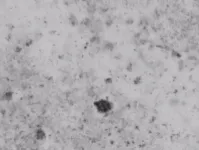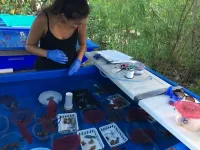(Press-News.org) A promising new cancer therapy also appears extremely potent against one of the world’s most devastating infectious diseases: tuberculosis (TB).
Scientists at Texas Biomedical Research Institute (Texas Biomed) found the therapy dramatically reduces TB growth, even for bacteria that are drug-resistant. The findings, reported in the journal Biomedicine & Pharmacotherapy, were made in novel cellular models featuring TB-infected human cells that can help accelerate screening of potential TB drugs and therapies like this one.
The therapy evaluated in this study combines two molecules – one of which is already FDA-approved for use in cancer patients, and another that is being evaluated in Phase 1/2 clinical trials for cancer. The compounds help the body initiate its normal cell death processes in targeted areas, be it cancerous cells, or in this case, cells infected with Mycobacterium tuberculosis (M.tb), the bacteria that causes TB.
TB accounts for more than 1.6 million deaths worldwide every year. The bacterium primarily infects the lungs. Patients must take antibiotics for months to bring active infection under control; drug resistance is on the rise, making treatment even more challenging.
Dr. Schlesinger’s lab at Texas Biomed is focused on understanding the fundamental biological interactions between the airborne-transmissible bacteria and humans, and then using those insights to identify potential treatment targets.
M.tb blocks a normal cell death process called apoptosis. This allows the bacteria to grow inside immune cells in the lungs, called alveolar macrophages. This new paper shows that by inhibiting two key proteins, MCL-1 and BCL-2, M.tb can no longer hijack the apoptosis process and macrophages are able to kill M.tb.
Importantly, this happens inside granuloma structures, the dense cellular clumps that the body forms around M.tb to try to contain it. Antibiotics and other treatments have a notoriously difficult time penetrating granulomas, which is one reason why M.tb is so hard to eliminate.
“Immunotherapy has been a gamechanger in the cancer field by finding ways to help a patient’s own immune system fight tumors more effectively,” says Larry Schlesinger, MD, Texas Biomed Professor, President and CEO, and senior paper author. “We believe that, similarly, host-directed therapies can be a gamechanger for infectious diseases.”
The research team, led by Texas Biomed Staff Scientist Eusondia Arnett, PhD, tested MCL-1 and BCL-2 inhibitors individually, together and in combination with TB antibiotics to see how TB growth was affected. Using both inhibitors was more effective at limiting TB growth than just one or the other; and combining them with antibiotics was far more effective than either inhibitors or antibiotics alone.
“The inhibitors combined with antibiotics controlled TB up to 98%, which is very exciting,” says Dr. Arnett, the first paper author. “But even more exciting is the inhibitors were just as effective at controlling drug-resistant TB as drug-susceptible TB. That is the power of a host-directed therapy targeting the human’s immune response versus trying to attack the pathogen directly.”
A key aspect of the research are the cellular models used to test the effectiveness of the inhibitors: human macrophages and a human granuloma model developed and refined in Dr. Schlesinger’s lab over the past decade. Human blood cells donated by volunteers are cultured with M.tb, which leads to the formation of granuloma-like structures.
“Granulomas are unique, dense environments that are not well replicated in mice,” Dr. Arnett says. “Our studies demonstrate that this cellular model can serve as an important bridge to identify compounds that can penetrate and retain activity in granulomas, before we move to the necessary – but more complex, time-consuming and expensive – animal research phase.”
Dr. Schlesinger and Dr. Arnett have filed a provisional patent for the combination therapy for infectious diseases. They are planning additional cell, mouse and nonhuman primate studies to gather further evidence about the therapy’s effectiveness and seek partnerships with industry collaborators. They are hopeful the therapy can move quickly to the clinic because years of safety studies have already been completed, or are underway, for the inhibitors for cancer applications.
END
Cancer therapy shows promise against tuberculosis
2023-11-16
ELSE PRESS RELEASES FROM THIS DATE:
Theoretical computer scientists awarded the John von Neumann Theory Prize
2023-11-16
Computer Science Professors Christos Papadimitriou and Mihalis Yannakakis received the John von Neumann Theory Prize for their research in computational complexity theory that explores the boundaries of efficiently solving decision and optimization problems crucial to operations research and management sciences.
The recipients were presented with the prize at the 2023 INFORMS Annual Meeting in October in Phoenix, AZ. The Institute for Operations Research and the Management Sciences (INFORMS) first awarded the prize in 1975 to honor a body of work that has proven its lasting value in operations research and management sciences. ...
Heat tolerant coral may trade fast growth for resilience
2023-11-16
Algae living within the soft tissue of coral supply much of the energy needed by their hosts, and some symbiotic algae help coral withstand warmer water better than others. In a recently published study led by the University of Hawai‘i at Mānoa, researchers found that there was a tradeoff for corals dominated by the thermally sensitive algae—they have higher growth, but only in cooler water.
“As the ocean continues to warm, understanding how symbionts and environmental factors affect coral growth and health will help predict reef futures and inform conservation interventions where coral stocks are selected ...
Genomic tug of war could boost cancer therapy
2023-11-16
Some patients with myelodysplastic syndromes, like acute myeloid leukemia, benefit from a chemotherapy drug called decitabine that stunts cancer growth. But many others are resistant to decatibine’s effects or become resistant over time. Wilmot Cancer Institute researchers have uncovered a “genomic tug of war” in animal studies that could influence how well certain patients—or certain cancers—respond to decitabine.
In a study published in the journal Development, ...
New research questions the nature and meaning of "psychic-channeling" experiences
2023-11-16
The question of disembodied consciousness or the afterlife has received much scientific scrutiny over the last several years. One line of research involves so-called "channelers" or mediums who claim to receive and communicate information that they believe comes from some other being or dimension of reality that differs from everyday reality. Now, an international team of scientists has critically examined these claims. New research published in the Journal of Scientific Exploration asked 15 pre-vetted channelers to access the same "nonphysical being or spirit" source and answer a structured set of 10 questions from the scientific team. The statistical ...
Drug manufacturers use FDA, patent strategies to keep insulin prices high
2023-11-16
Over the last four decades, insulin manufacturers have extended their periods of market exclusivity on brand-name insulin products by employing several strategies, including filing additional patents on their products after FDA approval and obtaining many patents on delivery devices for their insulin products. That is the conclusion of a new analysis of FDA and patent records carried out by William Feldman of Brigham and Women’s Hospital, USA, and colleagues, and published November 16th in the open access journal PLOS Medicine.
Insulin is the primary, life-saving treatment for type 1 and some type 2 diabetes but remains costly in the US even ...
Growing income inequities in the utilization of healthcare resources, Swedish study finds
2023-11-16
Swedish people with the lowest incomes utilize primary and outpatient care on par with those with the highest incomes despite having significantly higher mortality rates, according to a new study published November 16th in the open access journal PLOS Medicine by Pär Flodin of Karolinska Institutet, Sweden, and colleagues.
Socioeconomic differences in healthcare utilization have persisted in modern welfare states even with universal healthcare. In recent decades, Sweden has witnessed a rise in income inequalities, accompanied by shifts in the sociodemographic composition of the population ...
Love thy neighbor: Cooperation extends beyond one’s own group in wild bonobos
2023-11-16
A new study published this week in Science challenges the notion that only humans are capable of forming strong and strategic cooperative relationships and sharing resources across non-family groups. Researchers from Harvard University and the German Primate Center examined the pro-social behavior of bonobos (Pan paniscus), one of humanity’s closest living relatives, finding that their cooperation extends beyond one’s own group to societal cooperation with different groups.
Studying humans' two closest living relatives, chimpanzees and bonobos, can help reconstruct ancestral human traits like cooperation and conflict. Despite living in similar ...
New molecular glue degraders could help target troublesome proteins
2023-11-16
Cells contain molecular machinery that targets and disposes of unwanted proteins to maintain homeostasis. Scientists think that with the help of “matchmaker” molecules called molecular glue degraders, this machinery could be hijacked to control proteins involved in diseases like cancer. But only a few of these glue degraders have been discovered so far—and mostly by chance.
Zuzanna Kozicka, as a Ph.D. student at Friedrich Miescher Institute in Basel, Switzerland, embarked on a deliberate search for these glues with her team and identified a novel class of molecular glue degraders with more than 40 chemically diverse members. Kozicka, who is now a postdoctoral ...
High efficiency and cooling performance in an electrocaloric heat pump
2023-11-16
Researchers have developed a solid-state electrocaloric cooling device that can generate a 20 kelvin temperature difference with high efficiency, according to a new study. The findings show that electrocaloric cooling can compete with other solid-state cooling strategies and offer a promising alternative to environmentally unfriendly vapor compression cooling. Cooling devices, including air-conditioning and heat pump systems, are estimated to consume roughly 20% of global electricity. Most of these systems operate through vapor-compression technologies, which are relatively inefficient and require environmentally harmful fluorinated refrigerants. Cooling through solid-state electrocaloric ...
The secret behind mussels’ quick-release interface
2023-11-16
The same bundle of non-living filaments that mussels use to anchor themselves within their environment – to withstand crushing waves, for example – can also be jettisoned on demand. Mussels create this quick-release interface, a new study finds, by way of a neurochemically-mediated junction, where billions of motile cilia hold fast to interlinked biopolymer sheets. "[The study’s] findings could be informative about how nonliving materials can be dynamically interfaced with living tissue, as in the case of detachable biosensors and medical implants," write Guoqing Pan and Bin Li in a related ...







